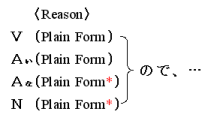The meaning of ので is the same as that of それで(Lesson 17-9-1), but unlike それで which is placed at the beginning of a sentence, ので is used within a sentence.
*For non-past affirmative na-adjectives and nouns, drop the だ ending of the plain form and put な before ので.

![]() 兄は びょうきに なったので、学校を 休みました。
兄は びょうきに なったので、学校を 休みました。
My older brother became ill, so he didn't go to school.

![]() この テープは だいぶ 古いので、いい 音が しません。
この テープは だいぶ 古いので、いい 音が しません。
This tape is pretty old, so the sound is not good.

![]() 図書室は しずかなので、よく べんきょうが できます。
図書室は しずかなので、よく べんきょうが できます。
It's quiet in the library room, so we can study a lot.
Lesson 10-7「よく わかりませんから、もういちど 先生に ききましょう。」
It is not very clear, so let's ask the teacher again.
|
【~ので、それで】【~から、だから】
ので and それで are often followed by a fact or a phenomenon consequent to a
preceding event. They are rarely used with sentences which has the following endings: ×~でしょう (conjecture ; probably~) ×~ましょう (proposal, suggestion ; Lets'~) ×~なさい(imperative ; e.g., Do it.) ×~てください(request ; Please~) etc. On the other hand, から and だから are often used with the above sentence endings. |

